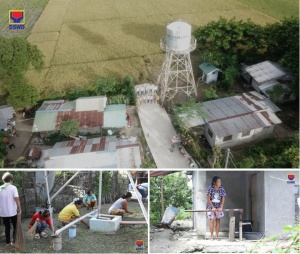
In a small barangay in Talugtug, Nueva Ecija, around 90 households are now benefiting from a much-needed water system.
This project is funded by the Kapit-Bisig Laban sa Kahirapan – Comprehensive and Integrated Delivery of Social Services (Kalahi-CIDSS) program of the Department of Social Welfare and Development (DSWD).
The Kalahi-CIDSS is one of the Philippine government’s poverty alleviation program that trains and engages communities and their local governments to select, design, and implement development projects that address their most pressing needs.
Before the introduction of the water system, the residents of Barangay Villa Rosario faced daily challenges due to unreliable and often contaminated water sources. This situation posed health risks and consumed valuable time, as many residents had to travel long distances to fetch water from distant sources and well pumps, especially during the dry season. The relief and comfort that the water system now brings to the residents are already palpable.
The turning point occurred in 2018 when clean water started flowing into the homes of the villagers for the very first time. This water system, made possible by the Kalahi-CIDSS, is a testament to the power of community-driven development. It has provided the community with safe and potable water and instilled a sense of hope and inspiration among the residents, significantly improving their quality of life.
Angelo Benedicto, a resident of Barangay Villa Rosario, is grateful for the water system project funded by the Kalahi-CIDSS program. He reflects on this opportunity and thanks the DSWD for the agency’s support.
“Wala pong maayos na napagkukunan ng tubig. Nahihirapan po kami sa pag-iigib. Tapos naranasan pa namin noong kami ay pumapasok sa eskwela na maagang gumising para lang po buhayin yung poso. Kapag dumadating yung panahon ng summer, nawawalan po ng tubig yung poso na pinagkukunan namin ng tubig,” Angelo said recalling their hardships before the water system project during an interview for the DSWD’s Mga Kwento ng Pag-Asa at Pagbabago (#KPAP), the Strategic Communications group’s online documentary.
“Sa mga nanunungkulan po sa Kalahi-CIDSS, maraming, maraming salamat po. Kung wala po yung Kalahi-CIDSS, marahil ay hirap pa rin po kami sa aming pamumuhay dahil sa problema namin sa poso,” Angelo narrated.
Angelo explained the project has significantly benefited the residents of Barangay Villa Rosario, particularly the children. Now, students do not have to wake up early to collect water, allowing them to concentrate on their education. This positive impact on the children’s education is a testament to the transformative power of the water system project.
“Noong dumating yung pagkakataon na makuha namin yung water system ay pinilit naming i-push para magkaroon kami ng pagkukunan ng malinis na tubig at hindi na kami mahihirapan sa pag-iigib. Malaki na rin po ang naitulong ng water system. Kapag kailangan namin ng tubig ay mayroon na agad. Lalo na po sa mga estudyante namin dahil hindi na nila kailangang gumising nang maaga,” Angelo shared.
Anita Tacdol, a community volunteer who advocated for the water system’s construction, recounted that the well pumps in their barangay would dry up every summer and often had a rusty taste.
“Kami po na nag-volunteer ng Kalahi-CIDSS, kami po ang nakakita ng problema na dapat tugunan dito sa aming barangay… Kulang po kami sa mga gamit na inuming tubig kasi yung mga poso po rito pag summer ay walang tubig. Tapos yung iba naman po, may tubig nga pero lasang kalawang naman at madumi yung tubig,” Anita told the DSWD’s KPAP.
Aside from providing clean water, the Kalahi-CIDSS project has had a broader impact on the community, particularly in empowering women to become active participants in local governance. Through Kalahi-CIDSS’s community-driven development (CDD) approach, women like Anita have played a crucial role in addressing local needs and fostering inclusive participation in decision-making processes that shape the future of their barangay.
The CDD approach is an internationally recognized strategy that promotes effective service delivery, reduces poverty, and enhances good governance. By empowering communities to control their resources and make decisions, Kalahi-CIDSS ensures that local solutions are tailored to address the specific needs of each area.This approach also enhances civil society and government’s capacity to respond effectively to disadvantaged communities’ needs.
The successful implementation of the water system project in Barangay Villa Rosario demonstrates the transformative potential of community-driven development. With residents now having access to safe and reliable water, they are empowered to work towards creating a brighter and more sustainable future for themselves and the future generation. (YADP)


